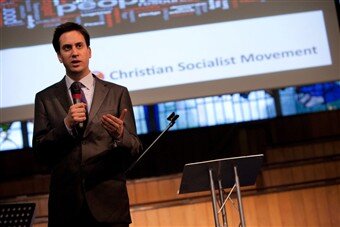The Christian Socialist Movement - fifty years on
There has always been a Christian voice in the Labour movement and the Labour Party and there has been much more than just a voice.
Labour is built on faith.
Many of its founding members came from church backgrounds and that provided it with a moral drive as they campaigned for social justice and against the evil of poverty. Throughout Labour’s history there have been many Christian Socialists active at all levels of the Party. It was not until the 1960s however that they were brought together in the Christian Socialist Movement. Fifty years later, CSM continues to work with others in Labour to bring about the fair society we so earnestly desire. We are celebrating both fifty years past and also our commitment to continue the work in the future.
Ed Miliband speaking at CSM's 50th anniversary reception on 23 May 2011 (JayButcherPhotography)
In the late 1950s a group of Christian Socialists met together in the Lamb pup in Bloomsbury. The subsequent Papers from the Lamb (the dual meaning intended) soon afterwards became the foundation for the Christian Socialist Movement, launched in 1960. The Papers from the Lamb covered common ownership, human and racial equality, international peace (including nuclear weapons), unity among Christians, Christians and the Soviet Union – very much a concern of the time and – and the obligations of prayer and thought. Led by the famous Methodist preacher Donald Soper, CSM brought together two existing organisations, the Socialist Christian League and the Society of Socialist Clergy and Ministers. Small in membership at first (though including Labour MPs from the start) it grew faster in the 1970s under active leaders. In the mid 1980s, after new socialist society affiliations were permitted, CSM affiliated to the Labour Party.
Christian Socialism itself can be dated back to 1848. Fired with enthusiasm after a Chartist demonstration, FD Maurice, Charles Kingsley, and John Ludlow, formed the first Christian Socialist group. Of note is that in the same year, the Communist Manifesto declared that ‘Christian Socialism is but the holy water with which the priest consecrates the heart-burnings of the aristocrat’. There was indeed something patrician, but sincere, about some of the first Christian Socialists. However they were driven by a concern for individual self worth as well as by the need for community action. The Christian faith teaches that all men and women are created equally, and they are created in the image of God. A society which denies this essential reality is one which needs reforming. This belief was shared by an increasing number of activists through the years. At the same time, the influence of the non conformist churches was seen in the organisation of trade unions and cooperatives and, ultimately, in the foundation of the Labour Party.
CSM became more widely known when John Smith became Labour leader in 1992. The following year he gave CSM’s annual Tawney Lecture, entitled Reclaiming the Ground. It was perhaps less easy to talk about faith and politics in those days and Smith generated a few headlines with his declaration of faith – as both a Christian and a socialist: ‘Just as the Christian stands by the fundamental tenets of Christianity, so the socialist should stand by the tenets of socialism. For me, socialism is largely Christian ethical values…Politics is a moral activity. Values should shine through at all times.’ His successor as leader, Tony Blair, also declared himself a Christian Socialist. CSM increased its efforts and appointed its first full time coordinator or director, David Cairns who worked closely with the then chair Chris Bryant. David passed away this month and will be much missed. Strongly supporting the change to Labour’s Clause Four, CSM later reviewed and revised its own values statement (available on our website). Labour has itself recognised the role faith plays. For example, Gordon Brown and Ed Miliband both appointed CSM MP Stephen Timms as a vice chair for faith on becoming leader.
Christian Socialists, or the Christian Left as some like to describe themselves, have continued to emphasise the importance of the individual in community. This is the Biblical view of humanity and of the new creation. When one aspect is given too much emphasis, things start to go wrong. When politics becomes too focused on the individual, we lose sight of the common good. When we focus too much on collective action, we undermine the value and identity of each person. This is why Christian Socialism is sometimes viewed with suspicion by elements of both the right and the left in politics. However, Christian Socialists carry on regardless, determined to be a prophetic witness in politics.
At the heart of Christian Socialist thinking has been equality, linked to faith in God. As RH Tawney wrote in his diary in March 1930: ‘In order to believe in human equality it is necessary to believe in God. It is only when one contemplates the infinitely great that human differences appear so infinitely small as to be negligible…What is wrong with the modern world is that having ceased to believe in the greatness of God, and therefore, the infinite smallness (or greatness – the same thing!) of man it has to invent or emphasise distinctions between men.’
As we work towards the renewal of the Labour Party, CSM is playing a role. It works, as it always has, alongside those who share the same goals if not necessarily the same creed. Cited by those who call for Labour to draw on its ethical socialist roots, CSM has launched Labour Neighbours, a project designed to help local Labour parties to build deeper relationships with their local communities. We hope to roll out this project in constituencies throughout the country. Meanwhile we are also contributing to the Labour Party’s policy review.
We never forget however that CSM plays a vital role as a bridge between Labour and the church. We seek to encourage Labour voters in the church to take another step and support the work of Christians at all levels in the Labour Party. Many have become involved in Labour through first finding CSM. CSM is a place where people ca build relationships and share perspectives, whatever their level of involvement in politics. There is more that we can do and we can be even better at what we do already. As we look ahead to the next fifty years, our hope is that we can continue to be salt and light in progressive politics. We look to the vision our members have to be part of this future.
This essay was published for the Christian Socialist Movement's 50th anniversary reception on 23 May 2011.


